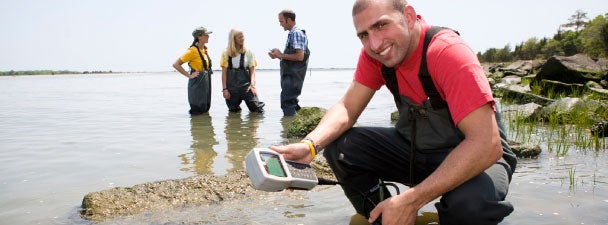
When a hydrologist and a geochemist put a trip to India together, Josh Lieberman ’11, a geology major in need of a field study course, knew he had to go.
At that point, Lieberman hadn’t ventured beyond the North American continent, but he was eager to “be a part of a different culture and really get to see how people in that culture interact.”
The study abroad class combined two upper-level geology courses – geology professor Tim Callahan’s Water Resources of India and environmental geochemist Vijay Vulava’s Pollution in the Developing World. After an 18-hour flight, the students traveled by train and bus into the mountains to the source of the Ganges River. They hiked in the Himalayas and traveled on the river by boat, through New Delhi to Calcutta and beyond. They learned where the water was coming from, where it was going and how it played a role in so many lives.

“Being a geology major,” Lieberman explains, “you’ve got to get out in the field to really apply what you learn in class. It’s very difficult for me to visualize something on a blackboard, but if I can pick up a rock in the field, that’s entirely different. In India, we checked for sulfates, nitrates
and phosphates in the river. We’d analyze the data and discuss why we were getting our results.”
As they traveled around the country, they witnessed millions of people polluting the river. They saw how pollution entered a community and measured the chemical changes that had taken place downstream.
“To the Indian people,” he observes, “the Ganges is a goddess, so it cleans itself. But science teaches us that if we want to use this water, we need to clean it or treat it.”
This contradiction between science and religious/cultural beliefs also relates to business and hospitality/tourism – Lieberman’s two other majors. “Everything now is global,” says Lieberman, who also served as senior class treasurer. “In the realm of business, you’ll be dealing with a variety of people from all sorts of backgrounds and experiences, and navigating difficult situations. The balance issue we saw in India, between religion and science, helped me understand how tricky business decisions can be in many contexts.”
For Lieberman, the trip was also important because “we were putting our conceptual knowledge from so many other courses to work in the world beyond the classroom. That was a huge take away for me.”




